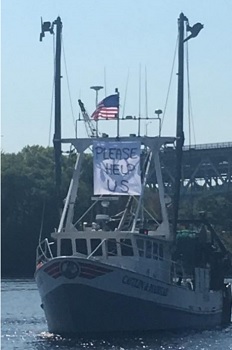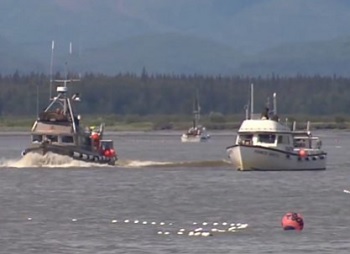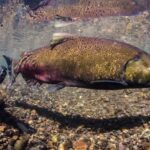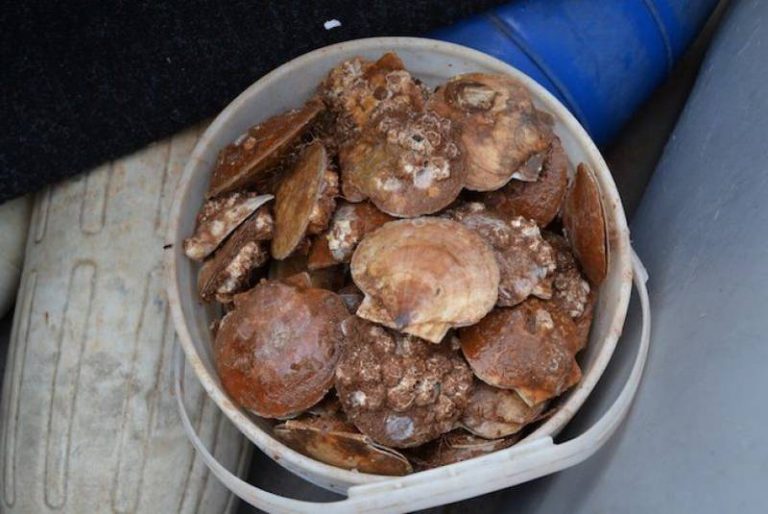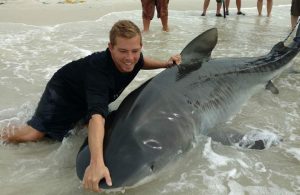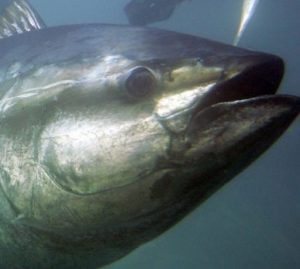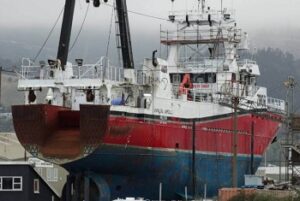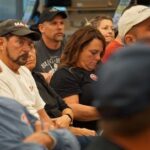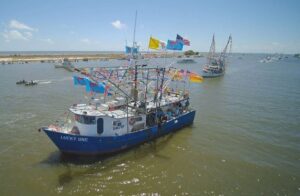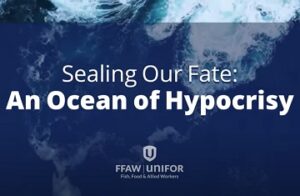Tag Archives: Coronavirus

Coronavirus: Cordova faces big decisions over how to run its famous early-season salmon fishery
The famous Copper River drift gillnet season, known for prized fish that fetch high prices and high demand across America, is the earliest salmon fishery to start in the state, usually kicking off the first or second week of May. Thousands of fishermen and processing and support workers are expected to enter Cordova, a community with about 2,500 year-round residents and a hospital without any ICU beds. Some residents have called on officials to restrict travel into town, seeing it as the best way to keep the new coronavirus from spreading. >click to read< 09:18
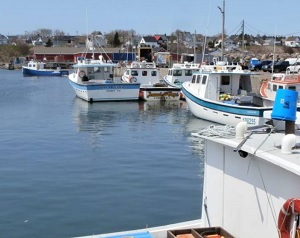
Northern N.S. lobster fishermen fear impact of Coronavirus on communities
Leonard LeBlanc says his phone has been ringing off the hook. The retired fisherman now the president of the Gulf Nova Scotia Fishermen’s Coalition, “Last night I had a call from a fisherman’s wife who was crying on the phone,” LeBlanc said. “She said ‘I don’t know what I’m going to do this spring. My husband is going to have to be separated from me for the entire fishing season. We have two young kids and he doesn’t want to take the chance to infect the kids with the virus.’” Fish harvesters and processors have been deemed an essential service by the federal government, but some are concerned going ahead with the season would be a recipe for disaster for their families and communities. >click to read< 11:43
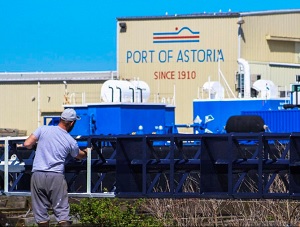
Coronavirus undercuts Port of Astoria’s progress
Will Isom, the Port’s executive director, has focused on low-cost projects that benefit the agency and keep staff busy during a massive drop-off in business caused by the coronavirus.,, Bornstein and Da Yang seafood companies, which employ hundreds of people processing, freezing and shipping catch on Pier 2, have so far kept operating while checking workers’ temperatures, increasing sanitation and enacting more social distancing. “It is a constant concern and effort,” said Andrew Bornstein, co-owner of Bornstein Seafoods with his family. “We have installed partitions, spaced out lines, broken up lunch and dinner breaks to have less people in the lunchroom at a time.” Commercial Dungeness crab prices were already hurt by China’s travel restrictions and ban of live-animal imports during the coronavirus outbreak. >click to read< 09:31
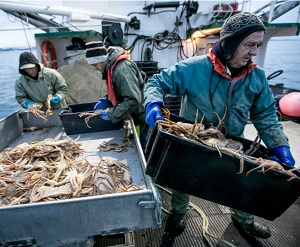
Nfld. & Labrador: Can you fish safely in a pandemic? Seafood industry facing hard Coronavirus questions
All commercial inshore fisheries are delayed until at least May 1,, as the department (DFO) and industry players work out protocols for safer operation of vessels and processing plants. According to Keith Sullivan, the president of the Fish, Food and Allied Workers union, plant workers and fish harvesters have many questions about how they are supposed to keep themselves and their families safe. “The vast majority of the input and the feedback and everything we’re hearing from members is that right now, with all of the advice that we have, they certainly don’t feel safe,”,,, Brenda Greenslade, physical distancing, “A harvester told me the other day, their accommodations when they sleep, their heads are so close together, they share the same dream,” she said. She’s hearing some suggestions that harvesters should be told to bring less crew out to sea, where possible. >click to read< 08:43
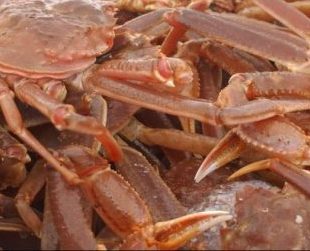
Feds delay Snow Crab season in Gulf of St. Lawrence
The Department of Fisheries and Oceans said the decision on Thursday to pause the season will let everyone involved in the fishery to put necessary health and safety measures in place. Seafood processors in the Maritimes had called on Ottawa to delay the crab and lobster season, warning that moving ahead with fishing risks workers’ health — and the bottom line — amid the COVID-19 pandemic.,, New Brunswick Premier Blaine Higgs said Thursday the province hopes Fisheries and Oceans Canada will delay the spring season for a few weeks, with the possibility of federal compensation. The Maritime Fishermen’s Union, which represents 1,200 harvesters in New Brunswick, said Friday they support a delay of the lobster season until May 15 >click to read< 16:28
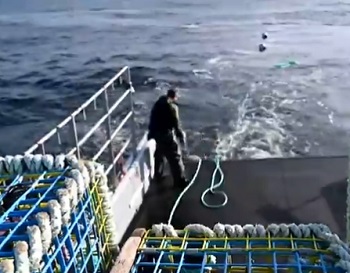
Nova Scotia’s lobster industry faces massive setbacks due to Coronavirus impacts
It was shaping up to be one the best seasons ever, but then COVID-19 struck. Geoff Irvine says “it was probably the best time in the lobster industry ever.” As executive director of the Lobster Council of Canada, things were looking up as the new decade began. The shore price was good, catches were consistent and filled the demands of the markets for live and processed lobster. Then, along came COVID-19. Irvine says the Chinese market, the Atlantic industry’s biggest for live lobster, started to collapse on January 25th as they began closing restaurants in China. Europe and the United States would soon follow. Why can’t fishers just wait it out until demand rises again? It’s not that simple. >click to read< 11:28
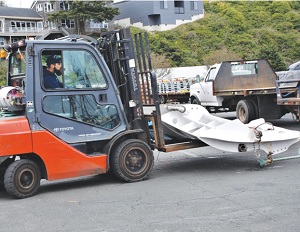
Port of Newport workers still providing services during coronavirus outbreak
With both agricultural and transportation implications, the Port of Newport is considered part of the country’s critical infrastructure as defined by the U.S. Department of Homeland Security. “Although the port is considered an essential public service provider, just like everyone, we had to adjust to the pandemic,” said Paula Miranda, port general manager. That decision-making led to keeping the commercial marina and international terminal operating while closing or significantly limiting some of the recreational facilities. The result is an “all hands on deck” call, to which the staff has responded favorably. “I can’t praise our staff enough,” the general manager said. >click to read< 09:59

“I just thought Tignish looked so docile,,,Tignish lobster-trap tree to be lit for Easter in recognition of essential workers, local fishermen
In 2018, the town made the tree using lobster traps as a way to honour the Island’s fishermen, but particularly Moe Getson and Glen DesRoches, two local fishermen who died when their boat capsized the same year. Tina Richard, the town’s recreation director who came up with the idea, said she was inspired while delivering groceries to her father who has been self-isolating. “I just thought Tignish looked so docile. Everything was dark, gloomy, nothing’s open … it just looked like a ghost town,” Richard said.,, As the town continues to try to navigate the pandemic, Richard said people have “really come together” to help each other out. Richard also noted that fishermen in the community are currently getting ready for setting day while not knowing if it will actually take place. >click to read< 22:48

With Coronavirus pandemic ravaging our country, temporary relaxation of fishery regulations is urged to help fishing industry
Thanks to our Senators and Congressmen who worked to get specific aid to the fishing industry, that has been hit particularly hard by the closure of restaurants, where 70 per cent of seafood in this country is consumed. Fishermen and wholesalers have had to adapt on the fly and find other ways to market their product to various degrees of success. The closure of so many vital aspects of our domestic economy will have effects that will still be felt a long time after the Virus is tamed.,, I am requesting that NMFS immediately contact the various management councils and commissions to request that special meetings [webinars] of fishery advisory panels be held to discuss the pro’s and cons of this idea, and what fisheries could benefit.,,, By Jim Lovgren. >click to read< 20:48
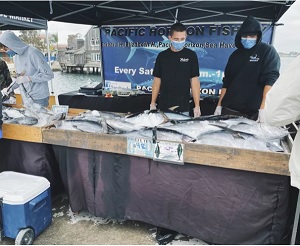
Coronavirus: San Diego’s Fishing Community Pivots to Stay Afloat
The COVID-19 shutdown of many of the city’s restaurants has left much of San Diego’s commercial fishing fleet reeling, and right now they’re doing everything they can to stay afloat including shifting the way they’re selling fish at the weekly Tuna Harbor Dockside Market, which has remained open as an essential business. “The commercial fishing fleet has always provided food for people and we’re still here,” says commercial fisherman Kelly Fukushima. “We want them to know they can rely on us to put food on people’s tables.” The crisis has been hard on local fishers. Commercial fishermen David Haworth and his son, Nick, had to scramble when wholesalers started calling them to say they could no longer sell their catch amid widespread restaurant closures. Home deliveries helped move the load of fish,,, >click to read< 15:31
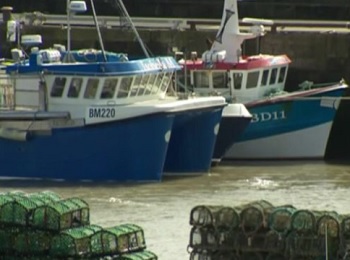
Coronavirus: Shellfish industry calls for government support – Fishermen face bleak year as pandemic bites
The East Yorkshire coast is home to the UK’s largest crab and lobster fishing industry, with about 80% of the catch exported. Fishing has been suspended and exports to China and Europe have become a “zero marketplace”, according to Bridlington fisherman John White. The industry is calling for more support from the government. >click to read< 11:03
Fishermen face bleak year as pandemic bites – The UK fishing sector has been badly hit by the coronavirus crisis, with the collapse of export markets and the shutdown of the hospitality industry leading to most boats being tied up. British fishermen export about 70% of their catch, mainly to continental Europe and Asia. The sharp fall in demand has been a “severe shock”, said Barrie Deas, chief executive of the National Federation of Fishermen’s Organisations. >click to read< 11:05
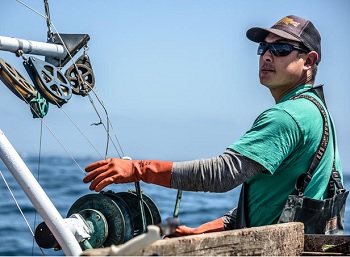
Local Commercial Salmon Fishing Industry Sees Silver Lining Amid Coronavirus Crisis
California’s fishing industry is designated as essential by Governor Gavin Newsom, but their usual markets, restaurants, are all but shut down because of the coronavirus. That’s spelling trouble for local fishermen and women. Still, some believe there’s a silver lining to this crisis. David Toriumi has been commercially fishing the Monterey Bay for almost 16 years. It’s a livelihood full of challenges, from rigorous and expensive regulations to changing ocean conditions. But the coronavirus is like nothing he’s seen before. Toriumi says the impact was slow at first, less people eating out, and then boom. >click to read< 08:44
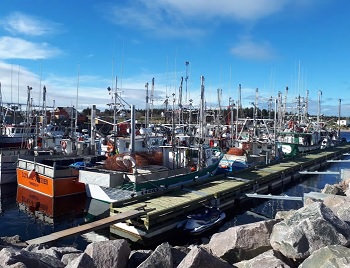
Fishermen in Eastern Quebec want season postponed to avoid Coronavirus outbreak in fishing villages
Leon Keats is set to go out to sea on April 20 to harvest crab in Zone 16A, off Anticosti Island. But the fishing captain wonders how he can do his job while respecting public health guidelines to limit the spread of the coronavirus, and without endangering residents of Kegaska, the village on the Lower North Shore, where he docks his boat during the 14-week period. “It’s unsanitary, and it’s impossible for us to live by the guidelines that Health Canada is asking us to respect right now,” said Keats. “It’s utterly impossible.” Keats and other fishermen in Eastern Quebec are asking Fisheries and Oceans Canada (DFO) to postpone the fishing season to ensure workers and residents of small fishing towns aren’t unnecessarily exposed to COVID-19. >click to read< 07:44
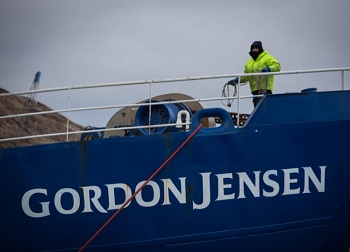
Coronavirus: Togiak herring fishery’s only processor says it aims for “zero impact” to communities
In early March, Icicle Seafoods locked down operations and stopped bringing on new crew members due to the pandemic. It says the workers on board its floating processor haven’t had contact with anyone off the vessel since then.,,, “Our plan is to bring the Gordon Jensen up to Togiak here at the end of the month. We’ll anchor off off shore, and we’ll keep our crew and staff on board the vessel for the duration of the fishery,” he said, adding that Icicle plans to have “zero impact” on the communities.,, Two seine boats and three gillnetters are expected to tap the 80-million pound quota in Togiak this spring. Tim Sands, an area management biologist for the Alaska Department of Fish and Game, said the shrinking participation from processors and fishermen is due to the lack of market for herring. >click to read< 18:33
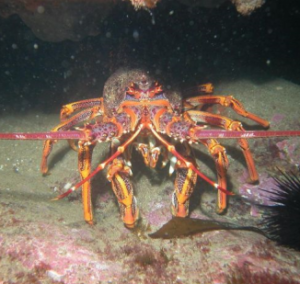
Lobster back on the menu for recovering China
In a welcome sign that life in China returning to normal, tonnes of rock lobster has left Perth for Shanghai in the past few days.The lobster left on return flights after mining billionaire Andrew Forrest and the West Australian government organised the delivery of medical equipment from China.Separate to those flights, it is understood the first air shipment of seafood and other fresh produce under the Morrison government’s $110 million rescue package for exporters will depart on Thursday.The indications China has regained its appetite for high-end Australian produce comes with local consumers set to enjoy an abundance of seafood at rock bottom prices on Good Friday. >click to read< 16:39
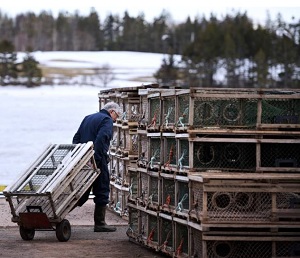
Prince Edward Island: Uncertainty looms over spring lobster fishing season
During a media briefing Tuesday night, Jamie Fox, Minister of Fisheries and Communities said clarity is needed on the future of the Spring fishing season from the federal government. “There is no definitive position, no consensus from any sector in this industry, or any region for that matter, as to what the best answer is. We have heard a variety of opinions from amongst fishers, from buyers, from processors – from all aspects of the sector,” King said during the briefing. “There is no consensus. Some want to go and are ready to go. Some don’t want to go. Some want to have a delay and many don’t know what to think.” The P.E.I. Fisherman’s Association, a key voice for the industry on P.E.I., has not issued a clear call whether or not they would like to see a fishing season proceed, or whether it should be delayed. >click to read< 09:23
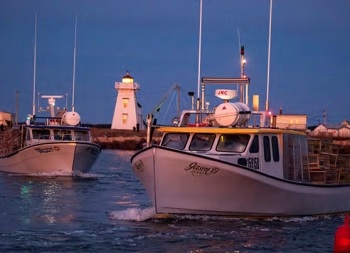 P.E.I. Fishermen’s Association surveying members on when, if spring lobster season should proceed – On Wednesday, the PEIFA posted a notice on its website saying a survey was coming by the end of the day. >click to read< 21:03
P.E.I. Fishermen’s Association surveying members on when, if spring lobster season should proceed – On Wednesday, the PEIFA posted a notice on its website saying a survey was coming by the end of the day. >click to read< 21:03
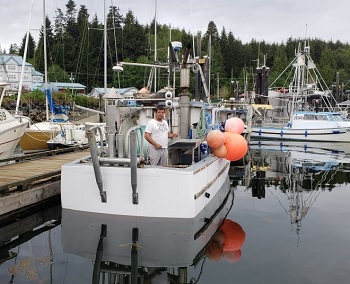
How is Coronavirus impacting BC’s fishermen?
Doug Kostering, a fisherman who docks in Port Hardy, had a two week delay to this start of his halibut fishing this year as the offices that handed out licenses were closed because of the virus. He estimates that two week delay alone resulted in an up to $30,000 loss in revenue. “Fishermen are in an uncertain industry to begin with. Fishermen traditionally take all the risk up front – they take out lines of credit, they take out loans, they do all the work to fix up their boats and get ready for their upcoming season,” said Chris Kantowicz, Skipper Otto’s COO. “And they do all that in hopes that not only will they catch fish, but once they have that fish in hand, that there will be a market for it. It’s a lot of risk and all of it lies with them.” >click to read< 07:06
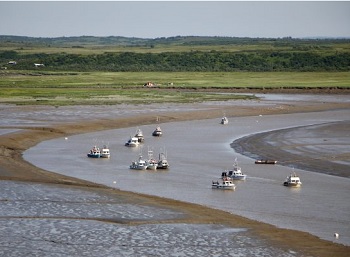
Coronavirus: Dillingham urges governor to close Bristol Bay fishery to protect the community
The City of Dillingham and the Curyung Tribal Council wrote a strongly worded letter to Governor Mike Dunleavy Monday urging him to consider closing Bristol Bay’s massive commercial fishery to protect the community from the coronavirus pandemic. Bristol Bay’s summer fishing season brings with it an influx of thousands of fishermen and processor workers into small communities around the region. The sockeye fishery is the largest in the world. Last year its preliminary ex-vessel value was the highest ever, at $306 million. In the letter, the tribe and the city said that there was no way to limit the communities’ exposure to the virus, even with the current requirement for processors to submit quarantine plans for their workers. >click to read< 17:05
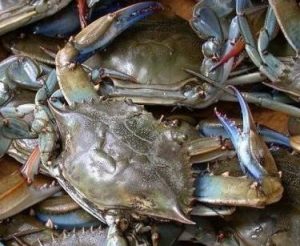
Coronavirus Assistance for Commercial Watermen and the Seafood Industry
The Hogan Administration acknowledges that the seafood industry is an iconic Maryland industry with commercial landing values over $82 million. The seafood industry also contributes over $600 million to Maryland’s economy. Given the economic hardships posed by the COVID-19 pandemic, commercial watermen who are self-employed may be eligible for the following relief programs: Small Business Administration (SBA) Paycheck Protection Program (PPP), Coronavirus Aid, Relief, and Economic Security (CARES) Act Relief Funding, more information, >click to read< 15:07

Coronavirus: Pop-up seafood market at Jersey Shore helps fishermen hurt by restaurant closures
A pop-up wholesale seafood market is helping to keep the fishing industry afloat in an Ocean County municipality. Point Pleasant Beach’s Shore Fresh Seafood Market is collaborating with the Fishermen’s Dock Cooperative to sell the catch — brought ashore on the docks directly behind the business — on its outdoor patio on Channel Drive.,, The next wholesale market is set for this Thursday through Sunday, 10 a.m. through 4 p.m. Offerings include sea bass, fluke, porgies, monk fish and sea scallops. more info, >click to read< 13:49
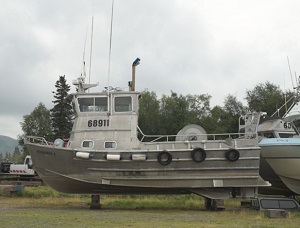
Coronavirus: Bristol Bay community leaders lay out minimum protocol needed to allow salmon season
Leaders of several major community organizations in Bristol Bay have issued a list of minimum protocols they expect to be in place before the commercial salmon fishery can take place this summer. Among other the protocol listed, fishermen and other seasonal workers would undergo a physical exam including a COVID-19 test with a negative result no more than 48 hours before traveling to the region. After arriving in Bristol Bay, the individuals would be transported to a quarantine location and remain in quarantine until a follow-up negative COVID-19 test is confirmed. The leaders listed out other expectations, including weekly health screenings, for the seafood industry to establish as minimum protocol for the 2020 season. >click to read< 11:12
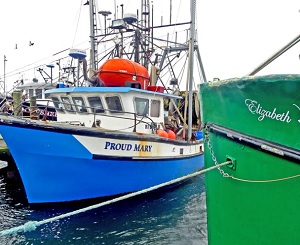
Coronavirus: Rhode Island’s commercial fishery and aquaculture industry hit hard
Until the COVID-19 pandemic, the Rhode Island aquaculture industry had been expanding. In 2019, the the total value of shellfish crops was $5.8 million and the industry employed about 200 people. Coastal Resources Management Council Aquaculture and Fisheries Coordinator David Beutel said the consequences of the evaporation of the major markets for shellfish are now being felt at all levels of the industry. “They can’t sell product because most of it goes to restaurants,” he said. The fin fishery is also suffering. Christopher Brown, executive director of the Rhode Island Commercial Fishermen’s Association, said the impact varied according to vessel size and catch. Social distancing is difficult, if not impossible, on a boat. >click to read< 10:17

Coronavirus: Fed temporarily waves at-sea observer requirement on Canadian fishing vessels
The Department of Fisheries and Oceans (DFO) says the at-sea monitoring program poses a public health risk for both observers and crews on board. An order immediately suspending at-sea observer coverage was signed by federal Fisheries and Oceans Minister Bernadette Jordan on April 2 and will remain in effect for 45 days. Some inshore fisheries in Canada do not require at-sea observers, but they are now routinely present on larger vessels as a licensing condition in many Canadian fisheries. Fishing companies pick up the cost of the observers, who collect scientific data and monitor fishing activity and compliance with the rules. >click to read< 07:21
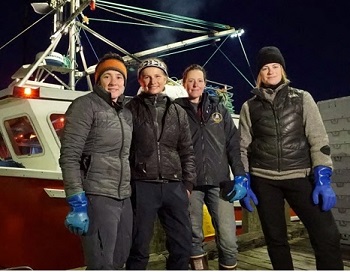
Coronavirus: Lunenburg lobster boat captain sells directly to consumers to stay afloat
It was shaping up to be one of Gail Atkinson’s best seasons ever, but then COVID-19 struck and the Lunenburg, N.S., lobster fisher had to get creative. Atkinson, who captains the Nellie Row, decided to keep her traps in the water even as prices plummeted. Now, she not only catches lobster, she also delivers it to customers in the Lunenburg area.,,, Atkinson is selling lobster for $8 a pound at the wharf and offering “contactless” delivery for customers near Lunenburg.,, Stephen Bond, co-chair of the Lobster Fishery Area 33 advisory committee, is taking the opposite approach. He applauds what Atkinson is doing, but said it’s not feasible for him given the size of his boat and crew. “There’s the select few, I’ll call them, that are able to follow Gail’s model or a smaller business model working with some of the local community, but it certainly doesn’t cover off the market that we’re missing,” >click to read< 19:55
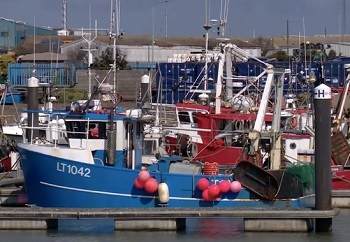
Fishermen across the East say their industry’s on a knife edge due to Coronavirus crisis
At Leigh on Sea in Essex, fisherman Paul Gibson says he’s experienced several challenges over the years, none of which amount to this scale. “The fishing industry is in absolute turmoil, ports have closed because of lack of demand, getting fish to supermarkets or to the continent where in the South East most of our fish goes, the markets have stopped.” Covid-19 follows years of decline in the industry here in the East, but now it could be fatal. Video, photo, >click to read< 16:27
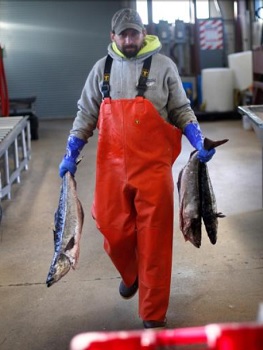
Coronavirus impacts New England seafood industry as wholesale demand fades
The spread of the coronavirus has upended the seafood industry as restaurants close, fishermen tie up their boats and even big-money catches like lobster see lower demand, industry leaders say. Robert Nagle, vice president of Boston-based seafood wholesaler John Nagle Co., said the industry is trying to do all that it can as more fishing boats are tying up because of a decrease in demand. “If a boat can’t get enough money, they can’t pay their bills, they can’t pay their crews, the boat is not viable,” Nagle said. Live lobsters, which are usually sold to restaurants and exported around the world, have been essentially shut down with no one to buy catches, Nagle said. >click to read< 12:03
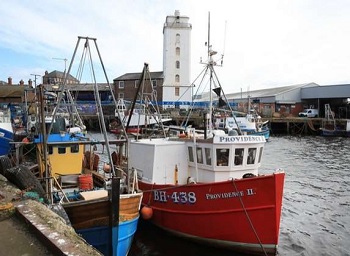
Coronavirus: Eat More Fish! Shoppers urged to support UK fishermen as export markets dry up
With the export markets to Europe and China ruined, restaurants and chippies closed, hospitality shut down and many supermarkets not staffing their fish counters, skippers have decided to keep their vessels tied up. But some are still going out to fish, and more of what they catch is available online or being sold door-to-door.,,, “Groups of fishermen around the UK are setting up websites so they can sell locally landed fish straight to local fishmongers or to households and we’re seeing an increase in the use of fish vans which makes it easier for people to buy seafood too. photos, >click to read< 09:42

Woes and blessings in the age of coronavirus, Rachel Blackmon Bryars
Those of us who grew up in the Bible Belt are very familiar with the good book’s many “woe-to-the” passages. Woe to the shepherds who destroy and scatter the sheep. Woe to those who call evil good, and good evil. Woe to the foolish. These passages have never been among my favorites, but the general phrase kept coming to mind this week, with a coronavirus twist. I still don’t like the woe-to-the mindset. I don’t like feeling angry. I don’t want to feed resentment. I want to hope for the best, believe the best, point to the best. Which is why I’m forcing my mind to pivot to a different phrase, “Blessed-are-the.” Blessed are the nurses, doctors, hospital staff, and medical workers of all types working tirelessly for days and nights on end. Who are on the front lines in a life-and-death battle. Who are heroes, each one. Blessed are the farmers, the ranchers, and the fishermen — remaining in the pastures, the fields, and on the seas so that we may feed our families. Blessed are the truckers who bring it all to market. >click to read< 07:23






